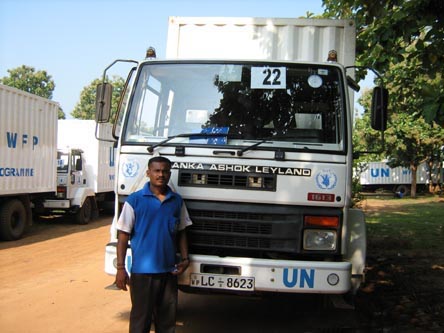The fourth food convoy since the relocation of UN and other international agencies in mid-September travelled to areas under the control of the Liberation Tigers of Tamil Eelam (LTTE) in the north on 3 November, officials said.
The World Food Programme convoy of 29 trucks carried 438 metric tonnes of food supplies for more than 230,000 internally displaced people (IDPs) in Tamil Tiger-held areas in the central north, known as the Vanni.
The civilians have been displaced by intense fighting since April in the western half of the Vanni between government forces and Tamil Tigers.
"We know these civilians have very little money and rely on this food aid right now, so these convoys must get through each week," Gordon Weiss, UN spokesman in Sri Lanka, told IRIN.
Since 3 October when the first of such joint convoys organised by the UN and government agencies travelled to the Vanni, the UN has sent at least 130 supply trucks with 2,300MT of food, according to officials. The government also transported more than 714MT of food, including flour, dhal, sugar and oil and 168,399 litres of kerosene last month, according to the latest situation report by the Inter-Agency Standing Committee (IASC) on 29 October.
The agencies temporarily relocated to Vavuniya, the closest government-controlled town in the south, on 16 September following a government directive amid deteriorating security.
Adequate supplies
The commissioner-general of essential services, SB Divaratne, the top government official overseeing the supplies to the Vanni, told IRIN there were adequate buffer stocks of food in the Vanni.
"The government agents [from the Vanni] have informed us that there are enough food supplies in the stores," he said. "So far there have been no reports of any shortages of essential items."
The IASC report also stated that despite the tense security environment in the Vanni, the government machinery was working satisfactorily. "People's coping mechanisms appear to remain intact presently, and government and community structures seem to be functioning well though with constraints in terms of capacity and material," it stated.
Shelter needs
The IASC situation report stated that UN officials accompanying a food convoy on 17 October had identified shelter and sanitary supplies as urgent requirements.
Seasonal rains lashed the Vanni in mid-October as many IDPs converged on low-lying areas prone to flooding. However, UN and government officials told IRIN no incidents of major flooding had been reported.
"We received the shelter needs from the government agents only last week and we are planning to send a convoy of shelter supplies," Divaratne said.
The UN will also send shelter material. "The most important thing is to continue the convoys. They remain the crucial supply line for the tens of thousands who have been displaced," Weiss said.
ap/bj/mw
This article was produced by IRIN News while it was part of the United Nations Office for the Coordination of Humanitarian Affairs. Please send queries on copyright or liability to the UN. For more information: https://shop.un.org/rights-permissions





